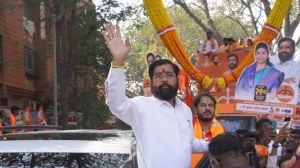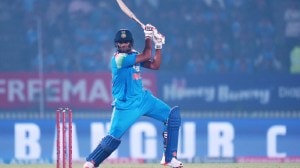A silent social shift
Maharashtra, which prides itself on pioneering lasting social movements in the country, might have done it again. The victory of four Dalit ...

Maharashtra, which prides itself on pioneering lasting social movements in the country, might have done it again. The victory of four Dalit candidates contesting with Congress support on a Republican Party of India ticket is now being described as a 8220;miracle8221;. It is also being seen as the beginning of a lasting social revolution that might set a new trend for the country by bringing about a larger acceptance for Dalits among the upper castes.
The surprise comes from the fact that the Congress has been able to convert all its higher caste votes to Dalits. This has rarely happened in the past, though the reverse is more easily accomplished.
In fact, the pre-poll arithmetic suggested a Congress-Samajwadi Party-RPI alliance could win most of the seats. The total of Congress votes and RPI votes in some constituencies was indeed more than what the BJP had polled last time. And the BJP was confident that arithmetic would not work so simply in politics. The Congress and the RPI were worried that the upper casteCongress votes would go elsewhere in constituencies where the candidates were Dalits. The BJP banked on the fact 8212; and tradition 8212; that not all upper caste Hindus vote for a Dalit candidate even if his/her party has formed an alliance with the Dalit party.
Even senior Congress leader Sharad Pawar acknowledged the miracle8217; as did BJP general secretary Pramod Mahajan. Ramdas Athawale, the RPI8217;s winning candidate from Mumbai North Central said: 8220;The biggest achievement of this election is the transfer of the Savarna vote to the Dalit candidates all over Maharashtra. We did not expect this to happen.8221; Acknowledged Mahajan: 8220;This is a veritable social revolution.8221;
Their stunned surprise is not misplaced. For even Dr B.R. Ambedkar, the architect of the Indian Constitution, found himself defeated from the open seat of Bhandara in Vidarbha and had to seek a mandate from a non-discriminating communist seat in West Bengal to find a berth in Pandit Jawaharlal Nehru8217;s national government in the 1952-56Parliament. Today, Bhandara8217;s neighbouring constituency, Chimur, has elected Jogendra Kawade despite a virtually non-existent campaign. 8220;Many people had no clue as to our symbols. But they searched the ballot paper to vote for us,8221; says Athawale.
Since 1957 this is the first time that Ambedkarites will sit in the Lok Sabha on a RPI ticket. Although there have been scheduled castes who have won on Congress tickets or those of other parties including the Shiv Sena, in the State legislatures, the vote was essentially for one particular ideology or leader. Rarely was it clear to the electorate that they were voting for candidates who might have once been among the most downtrodden of sections of Indian society. Successful though they might have been, it was not easy to bring about, and a lot of effort of Congress leaders as well as workers went into it. Constant meetings were held by Pawar and other senior party leaders to convince the upper castes to vote for these candidates. 8220;Even then we were not sure.In fact we had all but given up on Chimur and got a fright when initially R.S. Gavai was trailing in Amravati,8221; says Maharashtra Pradesh Congress Committee president Ranjit Deshmukh.
According to him, the party was wise enough to field these candidates from open rather than reserved constituencies. That was largely to restrain the resentment among Dalits from their own party who wished to contest on the reserved ticket. But the party might also have been experimenting after failure in 1990 of all the RPI candidates to win at the Assembly elections from Dalit-dominated constituencies after the Congress struck a pact with the Athawale faction of the party.
They lost all the seats but Pawar nominated at least three Ambedkarites to the State Legislative Council. In 1995, Dalit Ambedkarites found themselves left with no seats at all in the State Assembly after they chose to seek wider representation by fielding not just Dalit candidates from all over Maharashtra but even those representing other castegroups.
It was largely the lack of this representation in the State legislature that drove the RPI back into the arms of the Congress, though not many expected more than one of the four candidates to win at the Lok Sabha polls. Prakash Ambedkar, Dr Ambedkar8217;s grandson had been the clear favourite, having come the runner up in 1996 from Akola. His victory now he credits to not just the Congress and RPI votes but also 8220;the anti-BJP-Sena votes8221;. Mahajan and Chief Minister Manohar Joshi agreed that many of their committed voters had either not voted for them at all or voted against their parties. If this held true in the four seats being contested by the RPI candidates as well, then the Maharashtrian has proved to be remarkably progressive because Mahajan himself acknowledges that their vote is limited to the upper castes and they have hard times ahead in seeking to build bridges with Dalits in the State.
As Ambedkar put it, 8220;We had of course chalked out our own strategy to garner the maximum votes. Butwith this alliance it became easier. Now we must also try out this experiment in the wholly rural areas to see if the progressive thinking holds.8221;
- 01
- 02
- 03
- 04
- 05































